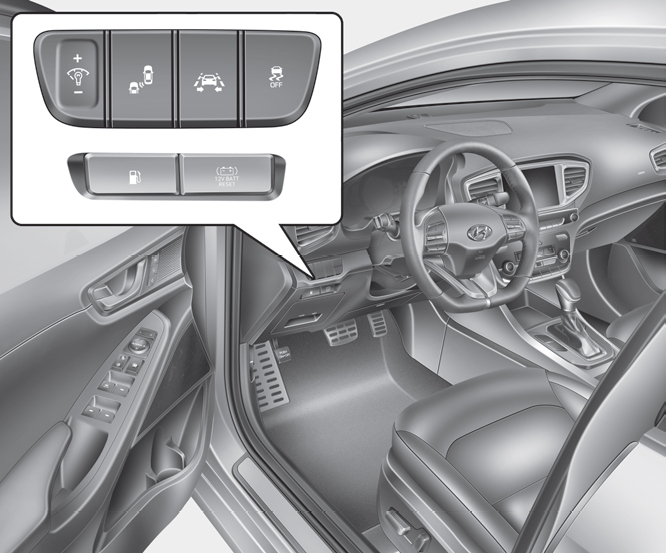Hyundai Ioniq: AHB(Active Hydraulic Boost) System / Hydraulic Power Unit. Repair procedures
Hyundai Ioniq (AE) 2017-2025 Service Manual / Brake System / AHB(Active Hydraulic Boost) System / Hydraulic Power Unit. Repair procedures
| Removal |
| 1. | Turn ignition switch OFF and disconnect the negative (-) battery cable. |
| 2. | Remove the wiring bracket.
|
| 3. | Remove the brake fluid from the reservoir with a syringe.
|
| 4. | Loosening the flare nut (A) and then disconnect the brake tube.
|
| 5. | Disconnect the PSU connector.
|
| 6. | Remove the front sub frame. (Refer to Suspension System - "Sub Frame") |
| 7. | Loosen the mounting bolt and nut then remove the PSU.
|
| Installation |
| 1. | Installation is the reverse of removal. |
| 2. | Tighten the PSU bracket bolts and brake tube to the specified torque. |
| 3. | After filling the brake fluid in the reservoir, perform the air bleed. . (Refer to AHB System - "AHB System Air Bleeding") |
| 4. | Conduct Pressure sensor Calibration. |
| 5. | Check the brake pedal operation. |
| Diagnostic Procedure Using GDS |
The following section describes how to diagnose faults using a diagnostic instrument.
| 1. | Connect the diagnostic instrument to the self-diagnostic connector (16-pin) beneath the crash pad on the side of driver's seat, and then turn on the ignition to activate the diagnostic instrument. |
| 2. | In the GDS Vehicle Type Selection menu, select "Vehicle Type" and "ABS/ESC" System, and then opt for "OK." [Pressure Sensor Calibration]
|
| 3. | Turn ignition switch off and on after calibration procedure. |
| 4. | Confirm success of calibration. |
 Hydraulic Power Unit. Components and components location
Hydraulic Power Unit. Components and components location
Components
•
PSU (Presser Source Unit) must not be disassembled.1. Pressure Source Unit (PSU)2. Pressure Source Unit (PSU) connector3...
Other information:
Hyundai Ioniq (AE) 2017-2025 Owner's Manual: High Beam Assist (HBA)
The High Beam Assist (HBA) is a system that automatically adjusts the headlamp range (switches between high beam and low beam) according to the brightness of other vehicles and road conditions. Operating condition 1. Place the headlamp switch in the AUTO position...
Hyundai Ioniq (AE) 2017-2025 Service Manual: Reservoir. Components and components location
C..
Categories
- Manuals Home
- 1st Generation Ioniq Owners Manual
- 1st Generation Ioniq Service Manual
- Coasting Guide (Plug-in hybrid vehicle)
- Check brakes/Check regenerative brakes, Check Virtual Engine Sound System
- Smart Cruise Control System
- New on site
- Most important about car
Hybrid Vehicle Interior Overview

1. Door lock/unlock button
2. Driver position memory system
3. Side view mirror control switch
4. Central door lock switch
Copyright © 2025 www.hioniqae.com








